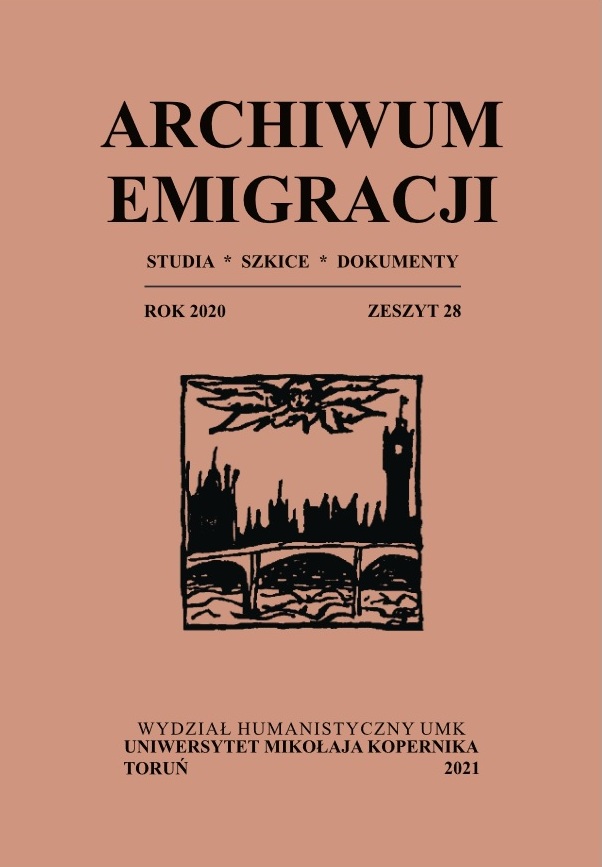Postmemorial Experiences — Comparing Australian and Canadian Second Generation Migrant Poetry. On the Basis of Selected Poetry by Lily Brett and Anne Michaels
DOI:
https://doi.org/10.12775/AE.2020.001Keywords
Lily Brett, Anne Michaels, postmemory, postmemorial poetry, Holocaust poetry, postpamięć, poezja postpamięci, poezja HolokaustuAbstract
POSTMEMORIAL EXPERIENCES — COMPARING AUSTRALIAN AND CANADIAN SECOND GENERATION MIGRANT POETRY ON THE BASIS OF SELECTED POETRY BY LILY BRETT AND ANNE MICHAELS
This article aims to look at selected volumes of poetry by renown Australian and Canadian poets of the second generation such as Lily Brett and Anne Michaels and trace their attempts at dealing with the heritage of memory handed down by their parents. Locating their emigrant literary oeuvre within the context of Marianne Hirsh’s idea of postmemory and the conviction that the post-Holocaust generations are “marked by memory” of their parents ([1997] 2002), Brett’s and Michaels’s poems can be viewed as written “against a rhetoric of the unspeakable” (Mandel 2001), a rhetoric which, according to Giorgio Agamben, lies foundations for poetry (1999). Both poets (whose literary output includes also novels) belong to the second generation of writers, born outside Poland after WWII, and they engage in considering the themes of postmemory, legacy of the Holocaust, and their personal take on the inherited trauma. Different in style and poetics, Brett’s and Michaels’s renditions of the traumatic past reveal striking similarities in evoking the topics of memory, languages, images of places and questions concerning the chances for and ways of healing despite the fact that the author live in such distant countries as Australia and Canada respectively. The article will, thus, explore the poets’ stance on the importance of remembering the trauma and commemorating the event central to their parents’ lives and mention the variegated stylistics which ranges from Brett’s simple language to Michaels’s extensive usage of metaphorical language.
DOŚWIADCZENIA POSTPAMIĘCI — PORÓWNANIE AUSTRALIJSKIEJ I KANADYJSKIEJ POEZJI EMIGRANTÓW DRUGIEGO POKOLENIA NA PODSTAWIE WYBRANYCH UTWORÓW LILY BRETT I ANNE MICHAELS
Niniejszy artykuł podejmuje temat postpamięci i próby radzenia sobie z nią w poezji emigrantek drugiego pokolenia z Australii i Kanady: Lily Brett i Anne Michaels piszących i publikujących w języku angielskim. Wybrana poezja Brett i Michaels analizowana jest w kontekście teorii postpamięci w ujęciu Marianne Hirsch, a także traktowana jako sprzeciw wobec „retoryki niewysławialnego” (Mandel 2001). Ponadto, dyskusja nad świadectwem jakim może być poezja wyrasta z myśli Giorgio Agambena i jego przekonania, że „to świadectwo może ufundować możliwość poezji” (2008). Obie poetki, będące także autorkami powieści i innych tekstów z gatunku non-fiction, urodziły się poza Polską, po II wojnie światowej w rodzinach naznaczonych doświadczeniem Holokaustu. Angażują się one w swojej poezji w rozważania dotyczące postpamięci, dziedzictwa Holokaustu, a także w osobiste próby przepracowania odziedziczonej traumy. Mimo różnorodności stylu i poetyk, a także odmiennej perspektywy narzuconej poniekąd przez dystans geograficzny, teksty Brett i Michaels wskazują na pewne podobieństwa w podejściu do pamięci, języka, obrazów czy pytań dotyczących radzenia sobie z traumą rodziców, która obecna jest w doświadczeniu drugiego pokolenia.
References
Adorno, Theodore. Prisms. Transl. Samuel and Sherry Weber. Cambridge: The MIT Press, 1983.
Agamben, Giorgio. Co zostaje z Auschwitz. Archiwum i świadek (Homo Sacer III). Transl. Sławomir Królak. Warszawa: Sic!, 2008.
Agamben, Giorgio. Remnants of Auschwitz. New York: Zone Books, 1999.
Benson, Eugene, and William Toye, eds. The Oxford Companion to Canadian Literature. Toronto and Oxford and New York: Oxford University Press, 1997.
Berger, John and Anne Michaels. Railtracks. Berkeley: Counterpoint, 2012.
Botez, Catalina. “Lost in Transculturation: Evicted Travellers in Lily Brett’s Things Could Be Worse and Anne Michaels’ Fugitive Pieces.” Literature and Aesthetics 20, no. 1 (2010): 92–107.
Brett, Lily. Auschwitz Poems. Wien and Frankfurt am Main: Suhrkamp, [1986] 2004.
Brett, Lily. Poland and Other Poems. Brunswick: Scribe, 1987.
Brett, Lily. After the War. Melbourne: Melbourne University Press, 1990.
Caruth, Cathy. Trauma. Explorations in Memory. Baltimore: The Johns Hopkins University Press, 1995.
Drewniak, Dagmara. “‘And yet, what would we be without memory?’ Visualizing Memory in Two Canadian Graphic Texts.” Studia Anglica Posnaniensia 53 (2018): 5–24. doi: 10.2478/stap-2018-0001
Drewniak, Dagmara. “‘It Is, After All, a Communication with Ghosts’: Correspondences by Anne Michaels and Bernice Eisenstein as a Historical and Personal Elegy in the Aftermath of the Holocaust.” In Aftermath. The Fall and Rise after the Event, eds. Robert Kusek, Beata Piątek, and Wojciech Szymański, 39–49. Kraków: Jagiellonian University Press, 2019.
Eaglestone, Robert. The Holocaust and the Postmodern. Oxford: Oxford University Press, 2008.
Eaglestone, Robert. “‘Working through’ and ‘awkward poetics’ in Second Generation Poetry: Lily Brett, Anne Michaels, Raymond Federman.” Critical Survey 20, no. 2 (2008): 18, 30.
Falconer, Robert. Hell in Contemporary Literature. Edinburgh: Edinburgh University Press, 2007.
Hafiz Ramji, Shazia. “All we Saw by Anne Michaels.” Accessed August 17, 2019. https://quillandquire.com/review/all-we-saw/.
Hirsch, Marianne. Family Frames. Photography Narrative and Postmemory. Cambridge and London: Harvard University Press, [1997] 2002.
Hoffman, Eva. After Such Knowledge. A Meditation on the Aftermath of the Holocaust. London: Vintage, [2004] 2005.
Kwapisz Williams, Katarzyna. “Transnational Literary Cultures in Australia: Writers of Polish Descent.” In The European Diaspora in Australia: An Interdisciplinary Perspective, eds. Bruno Mascitelli, Sonia Mycak, and Gerardo Papalia, 114–135. Newcastle upon Tyne: Cambridge Scholars Publishing, 2016.
Lovell, W. George. “Kanada at Auschwitz.” The Canadian Jewish News. Accessed July 20, 2020. https://www.cjnews.com/featured/jewish-learning/kanada-at-auschwitz.
Mandel, Naomi. “Rethinking ‘After Auschwitz’: Against a Rhetoric of the Unspeakable in Holocaust Writing.” boundary 28, no. 2 (2001): 203–228.
Michaels, Anne. Miner’s Pond. The Weight of Oranges. Skin Divers. London: Bloomsbury, 2000.
Michaels, Anne. All We Saw. New York: Alfred A. Knopf, 2017.
Michaels, Anne and Bernice Eisenstein. Correspondences. Toronto: McClelland & Stewart, 2013.
Pecaric, Sacha. “Niezdolność mówienia.” Accessed December 9, 2019. http://cdim.pl/sacha-pecaric-niezdolnosc-mowienia,1810.
Downloads
Published
How to Cite
Issue
Section
Stats
Number of views and downloads: 971
Number of citations: 0



